HistFest 2024 returned to the British Library in London, with an array of different sessions ranging from empire and slavery, to gendered history and espionage. This year’s celebrity guest featured “Succession” actor Brian Cox, who talked about his experience of playing a number of prominent historical characters. The aim of the festival is to make history more accessible to the wider public, as it states “for far too long, history has been the preserve of the privileged. Not anymore. History belongs to all.”
The literary festival celebrates the exciting work being undertaken by academics, teachers and public figures to bring together the many branches of history, in order to educate, entertain, and address some of the big questions about the use and misuse of history on the world stage.
Empires and entrepreneurs: unpacking the East India Company at HistFest 2024
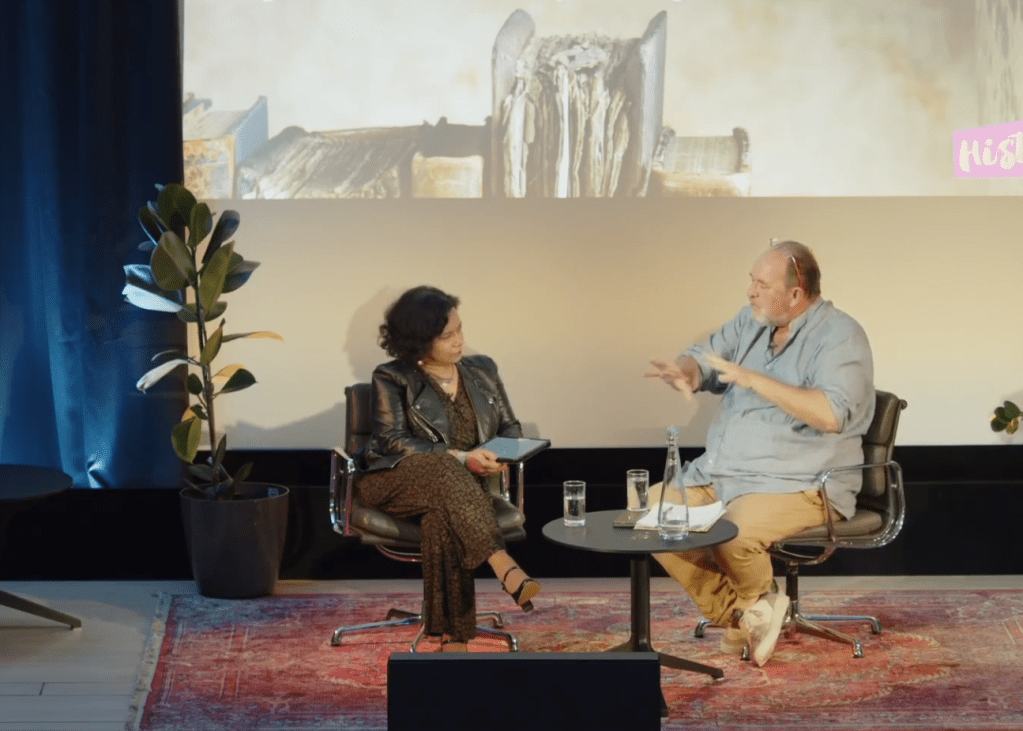
Historian William Dalrymple and Professor Nandini Das looked at the complicated history of the East India Company, and its devolution from a mercantile enterprise to an aggressive colonial power.
In a discussion titled “Empires and Entrepreneurs: The East India Company Story,” Dalrymple discussed how the Company established a new administration in India after defeating the young Mughal emperor in August 1765. This administration was run by English merchants and supported by a brutal private army. The East India Company’s original charter allowed it to engage in warfare, and it consistently resorted to violence to achieve its goals.
Das, an award-winning historian and author, pointed out the unusual nature of such joint-stock trading companies. “It allows ordinary people, the shoemakers and the rope makers of London with a little bit of spare cash to invest it for their hopeful 100% return. But there’s something else in terms of its licensing, which gives them enormous freedom,” said Das.
Dalrymple spoke about the lasting impact of the corporation concept on India, introduced during Elizabethan colonialism. “Probably the one that’s lasted longest and changed India most is the idea of a corporation,” he commented.
Read: India joins US as Mughal history banned from books
During the conversation, the historians talked about Robert Clive and his significant impact on the history of the East India Company. Despite his controversial tactics, Clive was crucial in the company’s growth in India. In the Battle of Plassey, Clive’s bold strategies played a crucial role in shifting the outcome in favour of the British with his cunning and at times ruthless tactics.
“I think what annoys me the most is that no one knows this stuff at all. It’s not taught in our schools…But also there’s this sense that the Brits have sort of woken up in the last 20 years to the big white elephant in their history syllabus, which is the absence of empire from the school curriculum as a core subject.”
William Dalrymple
Reflecting on the broader implications of such stories, Das and Dalrymple lamented the general lack of awareness about this critical period in colonial history. “No one learns this stuff in their school history classes,” Dalrymple pointed out, reiterating the need for a more inclusive and comprehensive approach to history education that does not shy away from discussing the complexities of colonialism and corporate power.
Medical herstories: the pioneering women in medicine
At another enlightening panel discussion titled “Plague Nurses & Lady Doctors: Unveiling Medical Herstories,” award-winning journalist and author Angela Saini facilitated a deep dive into the historic roles women have played in the field of medicine. Joined by Dr. Lara Thorpe and Kavitha Rao, the discussion spanned from the trials of early modern plague nurses to the pioneering Indian women doctors of the 19th century. We had the pleasure of speaking to Saini in season three of the podcast about her most recent book “The Patriarchs.”
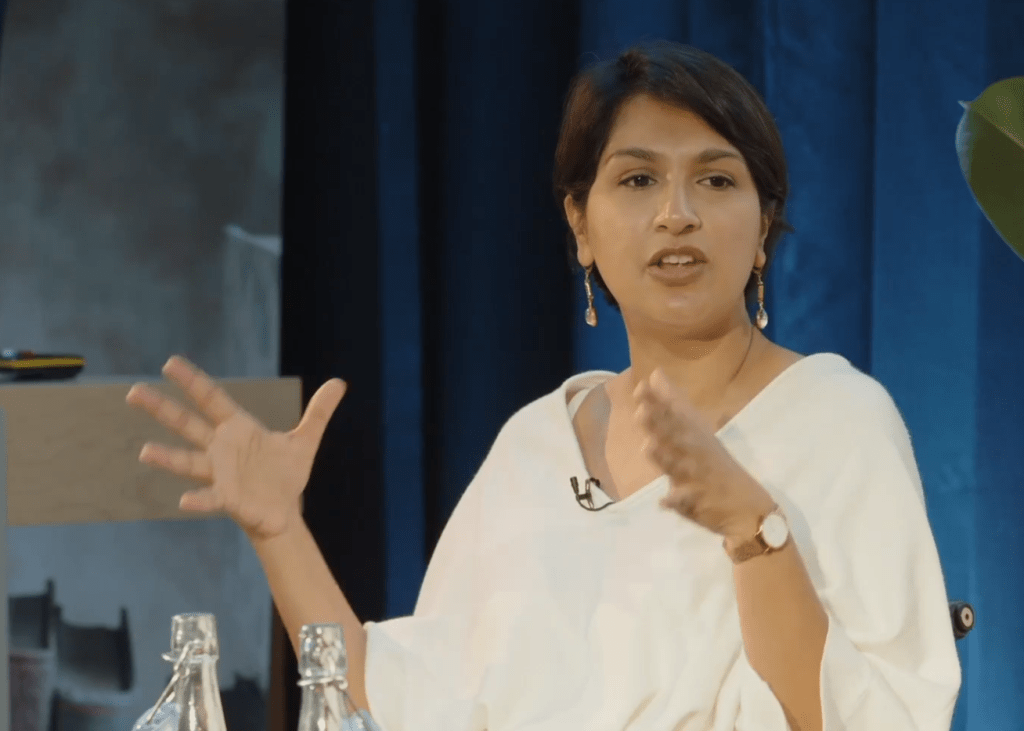
Dr. Thorpe, author of “Plague Nurses, Marginality, and Fear during the Great Plague of 1665”, highlighted the stark contrasts in medical practices between the 17th century and today, noting that “the world of medicine of the 17th century was, I think, fundamentally different, to what it is now.” She detailed how women, often marginalised, provided essential care during the plague, challenging the male-dominated medical narratives of the time.
Listen: What is Patriarchy – with The Patriarchs author Angela Saini
Rao, shedding light on her book “Lady Doctors: The Untold Stories of India’s First Women in Medicine”, discussed the serious impact of caste and social norms on women’s access to education and professional opportunities in India from the 1860s to the 1930s. She shared the inspiring story of Rukhmabai, a lower caste woman who overcame immense societal barriers: “She broke all the rules for a Hindu woman at that time. She went to court to divorce her husband, which was not allowed back in the 1880s… She then returned to India and lived as a single woman and practiced medicine for 35 years very quietly.”
The panel also explored how historical perceptions of women in medicine have evolved yet continue to face challenges. Dr. Thorpe pointed out the disparagement that women nurses endured during the plague, contrasting it with the reverence and romanticism often associated with their male counterparts. Meanwhile, Rao illuminated the complex journey of early female doctors in India, who navigated both colonial and patriarchal constraints to pioneer women’s roles in medicine.
According to Saini, it is important to grasp these narratives in order to fully understand the layers of history that impact our current healthcare systems and societal structures.
Clotilda descendants: preserving heritage and language in contemporary contexts
It was great to see Dr. Hannah Durkin in person, speaking about her new book “Survivors: The Lost Stories of the Last Captives of the Atlantic Slave Trade,” which we reviewed this year. Dr. Durkin shone a light on the histories of the Clotilda captives, the last group to be illegally shipped across the Atlantic into slavery, despite the 1807 US ban on the importation of enslaved Africans. Her book investigates the lives of these individuals, tracing their harrowing journey from modern-day Nigeria to their forced labour in Alabama and their ultimate legacy in the shaping of American communities like Africatown and the quilting circles of Gee’s Bend.
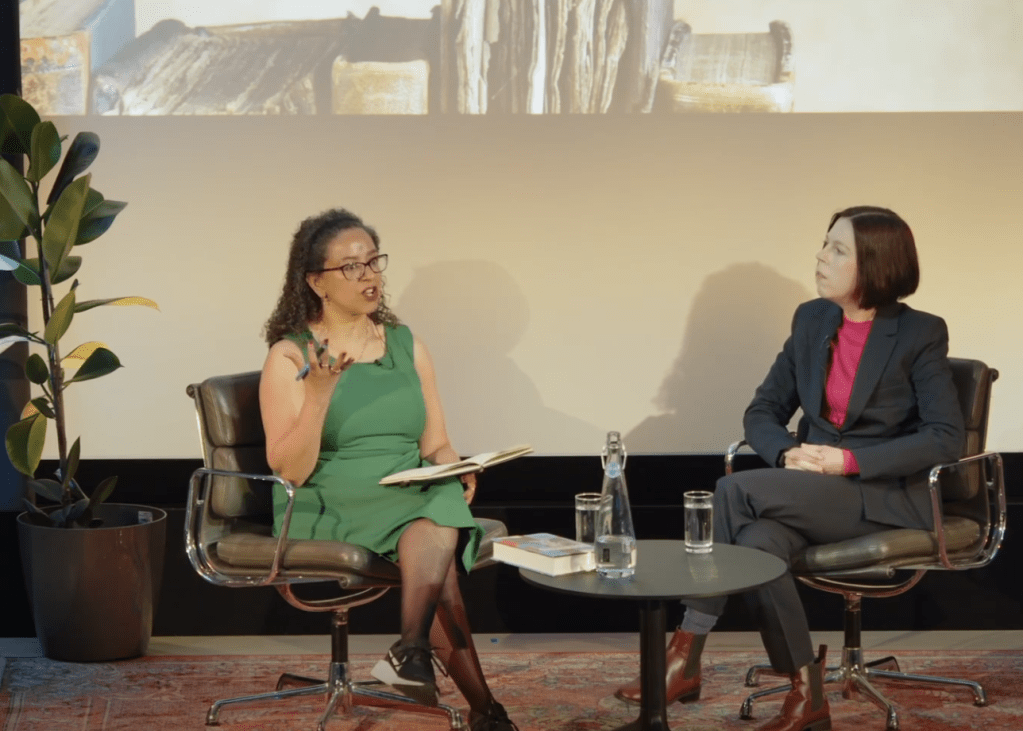
Dr. Durkin expressed, “There are almost no surviving testimonies of women survivors of the middle passage. So this was a chance to piece together stories that don’t really exist for survivors of the Middle Passage…despite the racist frameworks in which they’re perceived, they still managed to communicate their outrage, their sorrow, their humanity.”
“Hurston’s quite different because she’s interested in the working class, but at the same time, she doesn’t want to be seen.”
Dr. Hannah Durkin
Dr. Wanda Wyporska, who chaired the discussion, focused on the influence of Zora Neale Hurston‘s work on Dr. Durkin’s research, pointing out the ongoing tension between how African American communities wanted to present themselves and the harsh realities they faced. The author explained: “There’s very few Harlem Renaissance writers who write about slavery. They don’t want to, understandably. They’re battling to prove their right to citizenship. And the talk about enslaved ancestors seems to counter that as they want to prove that they’re middle-class citizens.
Read: Hannah Durkin: the Clotilda slave survivors and its lasting legacy – review
“Now, Hurston’s quite different because she’s interested in the working class, but at the same time, she doesn’t want to be seen,” she added.
The conversation also explored the broader implications of the transatlantic slave trade’s legacy in modern America. Dr. Durkin touched on the environmental and social challenges faced by Africatown, stating, “This polluting industry, the paper mills, it’s one of the most polluted parts of America…Lots of descendants of the Clotilda survivors community generally have died at young ages. They’re still battling for recognition.”
An audience member brought up the question of how the survivors’ descendants preserved their heritage, to which Dr. Durkin replied, “So if there was a big group of them, they could very easily, hold onto their language. What’s sad is that their children tend not to learn it. There was a sense of shame as they had seen all these racist ideas about Africa.”
Espionage exposed: the realities behind spy stories
In a fascinating discussion chaired by Histfest UK director Rebecca Rideal, historians Clare Mulley and Henry Hemming explored the true history of 20th-century espionage. They examined the lives of iconic spies and how intelligence gathering has evolved, bringing attention to the clear differences between Hollywood’s glamorous portrayals and the gritty realities of espionage.
“It’s the heart of human drama. What makes a story interesting is some kind of dramatic conflict between what you’re saying and what you mean. And in a way, that’s basically what spies do.”
Henry Hemming
Hemming shared insights into the allure of espionage: “It’s the heart of human drama. What makes a story interesting is some kind of dramatic conflict between what you’re saying and what you mean. And in a way, that’s basically what spies do.” He reflected on the personal intrigue of espionage, pondering, “Could I do that? What would it be like to be a spy?”
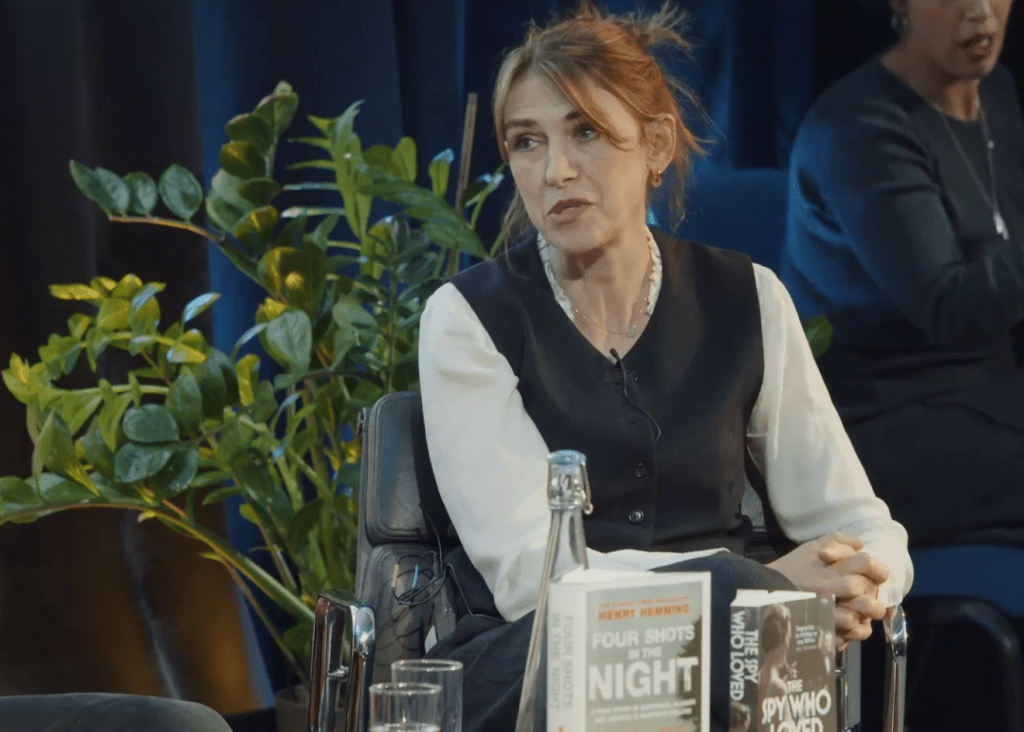
Mulley, who is also a broadcaster, discussed her attraction to espionage through untold stories of women in war, stating, “War, in a sense, enables women to take the centre ground. It’s that irony that women were recruited for a specific reason for these roles.
“It was because women in the 1940s and sometimes still today, tend to be overlooked and underestimated, and that gives you a bit of an advantage in the world of espionage,” “The Spy Who Loved” author said.
The conversation then shifted to the impact of fictional spies on real-world espionage. Hemming noted, “James Bond and George Smiley, invented by Ian Fleming and John le Carre, have both played a really interesting part in terms of recruiting spies in the real world. Bond makes espionage seem exciting, while Smiley adds a layer of enigmatic depth to the role of an agent runner.”
Read: Should classic books be rewritten for modern sensibilities? Experts say no
Mulley criticised Hollywood’s portrayal of female spies, highlighting the misconception around Christine Granville, often rumoured to be a lover of Ian Fleming. She clarified, “Christine Granville was not just a Bond girl. She was actually out there in three different theatres and one of the most effective special agents, male or female of the war. The longest-serving of them all.”
The historians also delved into the stories of lesser-known spies. Hemming introduced Maxwell Knight, an MI5 spymaster who uniquely combined his love for animals with espionage: “His understanding of animals translated into his skill in managing agents. He believed that women could be incredibly effective spies, changing the dynamics within MI5.”
The trio also discussed the impact of 20th-century intelligence operations. Hemming spoke about his latest book on a British spy murdered in the 1980s, highlighting the complexities of researching more contemporary espionage. Hemming explained, “There’s a lot less archive material because we need to wait longer for more stuff to come out… the allegation that began to surface soon after this man was killed is that he was killed by another British spy who was also inside the IRA. The reason The Troubles came to an end was that the IRA was so riddled with spies from the police, MI5, to the army, that they had almost no options other than to look for peace.”
Read: Why children should learn the truth – Stolen History author Sathnam Sanghera
The Sunday Times bestselling author detailed the scale of intelligence operations, saying that an interview in 2016 revealed that there were 800 agents in the greater Belfast area during the 1990s, a number considered an underestimate by MI5 professionals. This reflects one of the largest intelligence penetrations of a paramilitary organisation ever.”
The discussion also touched on the challenges of writing about recent historical events, which are often still raw in public memory. Hemming noted, “There has been too much secrecy, and even this story of just spies inside the IRA has barely been told. And when I tell you about the scale of it, you won’t believe me.”
Mulley added a heart-racing personal anecdote from her research on Granville, illustrating the dangers and dramatic moments encountered by historical figures and even historians themselves. Mulley recounted that during her research in Warsaw, she was mistaken for being part of a World War II TV series filming, a misunderstanding that led to a frightening encounter. She talked about an authority figure who ran towards her holding a handheld machine gun “that he started jabbing towards my neck”, which left the author in floods of tears. Thankfully, her fixer was able to clear up the situation.
Celebrity spotlight: Brian Cox discusses historical roles
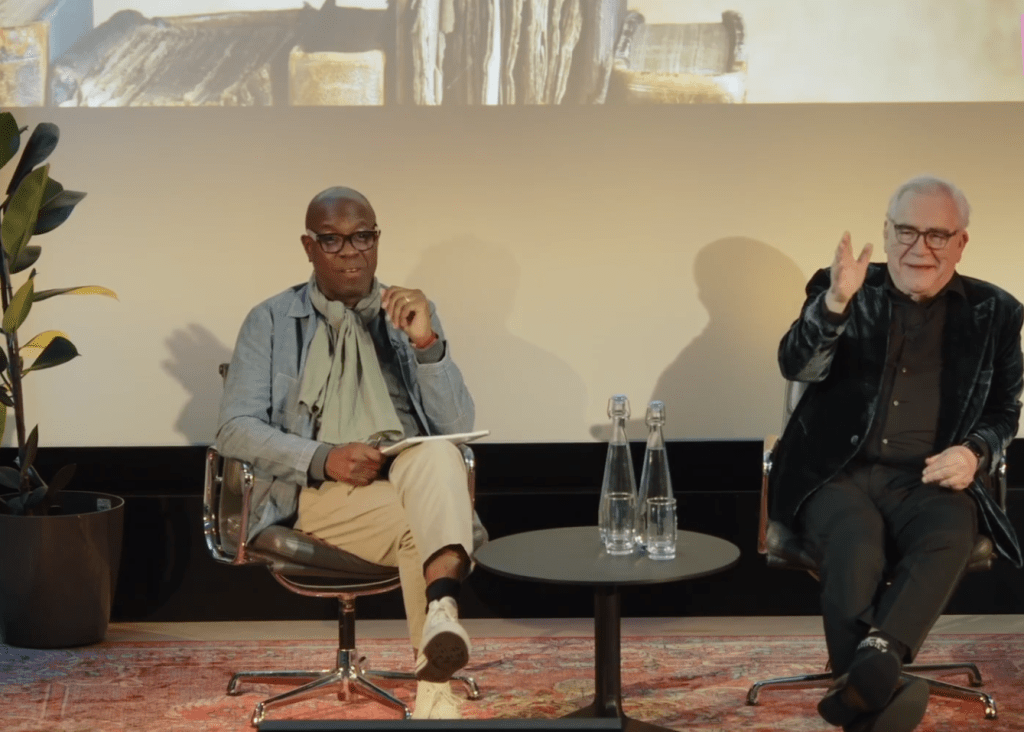
Actor Brian Cox discussed how he brings historical figures to life on stage and screen in the session “The Actor’s Craft: History through a Thespian’s Eyes.” The event, moderated by BBC broadcaster Clive Myrie, explored Cox’s impressive career, highlighting his performances in classic Shakespearean tragedies as well as contemporary television shows such as HBO’s “Succession.” Personally, I was particularly fond of his portrayal of the charmingly roguish, drunken father of Daphne in Frasier.
Brian Cox, with a diverse career spanning from winning an Olivier Award for his portrayal of Titus Andronicus with the Royal Shakespeare Company to earning a Golden Globe for his role in “Succession,” discussed his methods for breathing life into historical characters. His performances have featured major figures like Winston Churchill in “Churchill” and Hermann Goering in the Emmy-winning series “Nuremberg.”
The broadcaster asked Cox about the blend of historical accuracy and artistic interpretation in his roles: “You played Churchill and Hermann Goering in Emmy-winning TV series. So I’m interested, in how you go about exploring the past and exploring history in your work with the famous characters you portrayed.”
Read: Jaipur Literature Festival 2023: climate change, colonialism and constitution
The Emmy and Olivier award-winning actor explained the delicate balance required in historical portrayal: “Well, there’s a sort of combination of both. I think historically you’ve got to be accurate… It’s very interesting having played Churchill. Now, Churchill, in my hometown was deeply unpopular… And then you understand, why did the Dundee people hate him? Because of how he treated Ireland and was indirectly responsible for the death of Michael Collins.”
He also shared his experience playing Goering, providing a nuanced view of the controversial figure: “I found it fascinating to play Goering… he was regarded as a rather nasty piece of work, but when you examine Goering’s life, you realise he was a man who… ended up living in Switzerland for a number of years and had a nervous breakdown as a result… He was not part of the final solution… So you really begin to identify what the character was.”
Read: A Memoir of My Former Self: Hilary Mantel continues to excel – review
Discussing the creative process, Cox referenced novelist Hilary Mantel, who often found dramatic shape in real events. “A lot of it, of course, depends on the writer of the script… I played Cromwell, in Robert Bolt’s version of ‘A Man for All Seasons’… You begin to understand who he was, his ambition and that he was a plotter… And then you see this machinating force at work.”
HistFest 2024 concluded on an optimistic note, demonstrating that history is for everyone and that we must consider the diverse viewpoints that can shape the narrative.